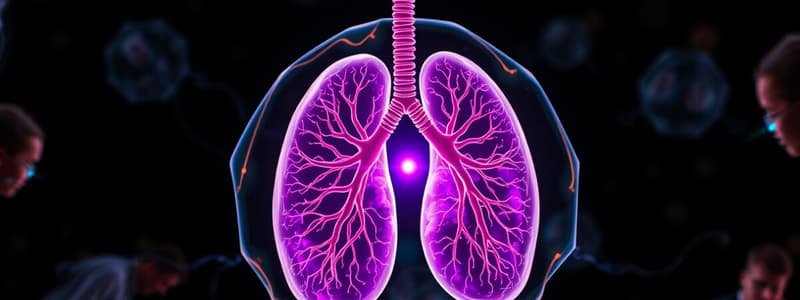Podcast
Questions and Answers
What is respiration?
What is respiration?
The process by which cells get energy from glucose.
What happens during respiration?
What happens during respiration?
Cells break down food molecules and release the energy stored in the food.
Describe what happens when an animal eats a plant.
Describe what happens when an animal eats a plant.
The stored energy is released for use through respiration.
Breathing is the same as respiration.
Breathing is the same as respiration.
What happens in stage one of respiration?
What happens in stage one of respiration?
What occurs in stage two of respiration?
What occurs in stage two of respiration?
What is the respiration equation?
What is the respiration equation?
What is fermentation?
What is fermentation?
What is alcoholic fermentation?
What is alcoholic fermentation?
Why is alcoholic fermentation important to bakers and brewers?
Why is alcoholic fermentation important to bakers and brewers?
What is lactic acid fermentation?
What is lactic acid fermentation?
Why does lactic acid fermentation happen?
Why does lactic acid fermentation happen?
In what part of the animal cell does respiration mainly occur?
In what part of the animal cell does respiration mainly occur?
Besides sugar, what is required for cellular respiration to occur?
Besides sugar, what is required for cellular respiration to occur?
Where does an animal get glucose from?
Where does an animal get glucose from?
How does an animal get oxygen?
How does an animal get oxygen?
How do animals get rid of the water produced?
How do animals get rid of the water produced?
What does an animal get out of the process of respiration?
What does an animal get out of the process of respiration?
Flashcards
What is respiration?
What is respiration?
The process where cells extract energy from glucose, essential for both plants and animals.
How Animals Get Energy
How Animals Get Energy
Animals obtain stored energy when they eat plants, which is then used during respiration.
What is Stage One of Respiration?
What is Stage One of Respiration?
The process where glucose is partially broken down without oxygen, yielding minimal energy.
What is Stage Two of Respiration?
What is Stage Two of Respiration?
Signup and view all the flashcards
What are the byproducts of respiration?
What are the byproducts of respiration?
Signup and view all the flashcards
Respiration Equation
Respiration Equation
Signup and view all the flashcards
Photosynthesis vs. Respiration
Photosynthesis vs. Respiration
Signup and view all the flashcards
What is Fermentation?
What is Fermentation?
Signup and view all the flashcards
Alcoholic Fermentation
Alcoholic Fermentation
Signup and view all the flashcards
Lactic Acid Fermentation
Lactic Acid Fermentation
Signup and view all the flashcards
Lactic Acid Buildup
Lactic Acid Buildup
Signup and view all the flashcards
Main Site of Respiration
Main Site of Respiration
Signup and view all the flashcards
What is required for cellular respiration?
What is required for cellular respiration?
Signup and view all the flashcards
Where do animals get glucose?
Where do animals get glucose?
Signup and view all the flashcards
Where do organisms get oxygen?
Where do organisms get oxygen?
Signup and view all the flashcards
How is water from respiration eliminated?
How is water from respiration eliminated?
Signup and view all the flashcards
Why is energy from respiration important?
Why is energy from respiration important?
Signup and view all the flashcards
Study Notes
Respiration Overview
- Respiration is the process where cells extract energy from glucose, occurring continuously in plants and animals.
- Energy is released during the breakdown of food molecules like sugars through respiration.
Energy Transfer in Animals
- When animals consume plants, they obtain stored energy from roots, fruits, leaves, and stems, utilized during respiration.
Distinction Between Breathing and Respiration
- Breathing is different from respiration; however, oxygen is essential for the respiration process.
Stages of Respiration
- Stage One:
- Takes place in the cytoplasm where glucose is partially broken down without oxygen involvement, releasing minimal energy.
- Stage Two:
- Occurs in the mitochondria, where molecules are further broken down, converting oxygen and sugar into carbon dioxide and water, releasing a substantial amount of energy.
Byproducts of Respiration
- Carbon dioxide and water produced in stage two diffuse out of cells, exiting through breath or stomata in plants.
Respiration Equation
- The formula for respiration is:
- C6-H12-O6 + 6O2 → 6CO2 + 6H2O + Energy.
Relationship Between Photosynthesis and Respiration
- Photosynthesis enables plants to absorb carbon dioxide and release oxygen, while respiration utilizes oxygen and generates carbon dioxide.
Types of Fermentation
- General Definition:
- Fermentation produces energy for cells without oxygen.
- Alcoholic Fermentation:
- Generates alcohol, carbon dioxide, and a little energy, crucial for bakers (dough rising) and brewers (alcoholic beverages).
- Lactic Acid Fermentation:
- Occurs in muscles during strenuous activity, generating lactic acid due to insufficient oxygen.
Lactic Acid and Physical Activity
- Lactic acid buildup happens when muscles exhaust oxygen faster than it can be replaced, causing post-exercise soreness.
Cellular Respiration Essentials
- Main site for respiration in animal cells is the mitochondria.
- Besides sugar, oxygen is required for cellular respiration.
- Animals obtain glucose from their food and oxygen from breathing air.
- Water produced from respiration is eliminated through breathing, sweating, and urination.
Importance of Energy from Respiration
- Organisms rely on energy derived from respiration for living activities, growth, and reproduction.
Studying That Suits You
Use AI to generate personalized quizzes and flashcards to suit your learning preferences.




